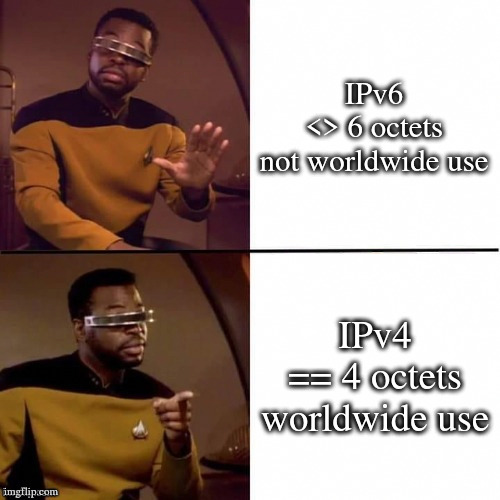this post was submitted on 19 Jun 2024
314 points (85.7% liked)
Programmer Humor
18971 readers
1156 users here now
Welcome to Programmer Humor!
This is a place where you can post jokes, memes, humor, etc. related to programming!
For sharing awful code theres also Programming Horror.
Rules
- Keep content in english
- No advertisements
- Posts must be related to programming or programmer topics
founded 1 year ago
MODERATORS
you are viewing a single comment's thread
view the rest of the comments
view the rest of the comments

Yes, but why would you want to? We have enough addresses for the foreseeable future.
1:1 stateless NAT is useful for static IPs. Since all your addresses are otherwise global, if you need to switch providers or give up your /64, then you'll need to re-address your static addresses. Instead, you can give your machines static private IPs, and just translate the prefix when going through NAT. It's a lot less horrible than IPv4 NAT since there's no connection tracking needed.
This is something I probably should have done setting up my home Kubernetes cluster. My current IPv6 prefix is from Hurricane Electric, and if my ISP ever gives me a real IPv6 prefix, I will have to delete the entire cluster and recreate it with the new prefix.
It should only be needed if your ISP is brain-dead and only gives you a /64 instead of what they should be doing and also giving you a /56 or /48 with prefix delegation (I.e it should be getting both a 64 for the wan interface, and a delegation for routing)
You router should be using that prefix and sticking just a /64 on the lan interface which it advertises appropriately (and you can route the others as you please)
Internal ipv6 should be using site-local ipv6, and if they have internet access they would have both addresses.
Nitpicking, but the address for the wan interface wouldn't have a prefix, so the host would just set it as a /128 (point-to-point)
Ehh, I've seen both. Perhaps not in a home router context though, never really bothered to check